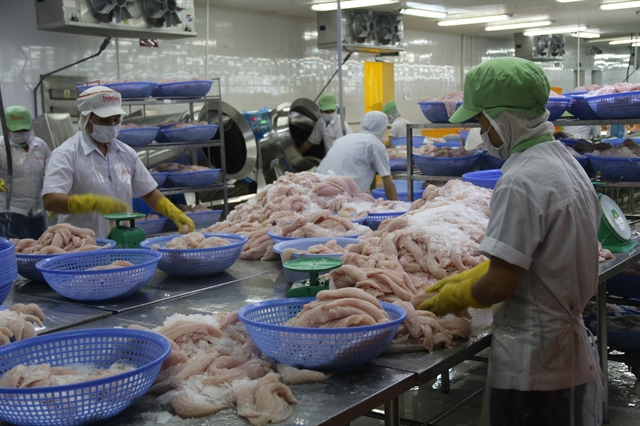 Society
Society


|
| Workers process tra (pangasius) fish at Tiền Giang Seafood Import-Export Company. Việt Nam needs more drastic measures to better control illegal fishing and have its yellow card lifted. - VNA/VNS Photo Minh Trí |
HÀ NỘI — Việt Nam needs to take drastic measures to promptly ease the complicity in illegal fishing and promote sustainable use of marine resources.
This will help Việt Nam get its yellow card – a warning from the European Commission (EU) that the country was not sufficiently tackling illegal, unreported and unregulated (IUU) fishing – lifted, the Ministry of Agriculture and Rural Development has said.
Speaking at the conference on urgent measures to lift the EU’s yellow card on Vietnamese seafood held yesterday, Nguyễn Quang Hùng, deputy director of the ministry’s Directorate of Fisheries said a delegation of the EU’s Directorate for Maritime Affairs and Fisheries is expected to visit Việt Nam in late May for the final check.
In case the country fails to have instituted controls on fishing and tracing origins, it will likely get a ‘red card’ warning – which means a complete trade ban on fisheries export to European markets.
If things go well, the EU will consider lifting the ‘yellow card’, he said.
On October 23, 2017, the EU issued an official warning that it would ban seafood imports from Việt Nam if the country did not take measures to tackle illegal, unreported, and unregulated (IUU) fishing.
The commission's carding system is the European Union's main tool in the fight against illegal fishing, encouraging countries to work with the commission to improve their fisheries governance and retain access to EU markets.
The EC stipulated that Việt Nam needed to complete nine recommendations to have the designation lifted. Those included revising its legal framework to ensure compliance with international and regional rules applicable to the conservation and management of fisheries resources; ensuring the effective implementation and enforcement of the country’s revised laws; increasing the traceability of its seafood products; preventing sales of IUU products; and strengthening the effective implementation of international rules and management measures.
A first round of inspections last May resulted in a six-month extension of the yellow card after a number of shortcomings in implementation of the recommendations were found.
A second round was planned to take place in November, but postponed until May.
Minister of Agriculture and Rural Development, Nguyễn Xuân Cường, said there are four recommendations the country has not yet been capable of enacting.
Of those, illegal fishing carried out by Vietnamese vessels in other countries’ territories has persisted.
Hùng of the Directorate of Fisheries said many measures had been taken to improve fisheries governance after the EC’s yellow card on Vietnamese seafood, including the issuance of the 2017 Fisheries Law and other related guiding documents on illegal fishing prevention by the ministry.
However, the improvement on tackling IUU fishing has remained modest, proven by rampant violations on fishing in other countries’ territories.
Reports from the Directorate of Fisheries in 2018 showed that 137 vessels illegally fishing in foreign water were found, an increase of 46 vessels compared to the previous year, mainly focused on the waters of Thailand, Malaysia, the Philippines, Cambodia, Indonesia and Brunei.
Since early this year, 26 violations have been found.
Explaining the cause of the increase on violations, Hùng said tight penalties on violators and loose management of authorised agencies, especially patrolling and supervising fishing offshore, have contributed to the situation.
Addressing the conference, Hùng has asked the Government office to quickly submit to the Prime Minister for approval the decree on sanctioning administrative violations in the field of fisheries and the decision to establish the National Steering Committee for prevention and control of IUU fishing.
He said that the agriculture ministry needed to guide localities to implement IUU fishing prevention, such as ensuring all offshore fishing vessels are licensed before July; refusing to re-grant licences for vessels on the list of IUU fishing; and revoking licences of vessels violating foreign waters.
Other measures, including regulations on monitoring and supervising vessels’ logs and records are needed, he said.
The ministry would work with relevant authorities to complete the database on fisheries, which would connect the central agencies and 28 coastal localities this May.
In terms of violations in foreign waters, representatives from the Ministry of Public Security said fishermen deliberately violated the regulations on fishing in foreign waters due to high profit.
Thus, it was necessary to punish violators as a way of curbing increasing violations.
More marine police need to be mobilised to regularly patrol and control the sea to deter violations, it said. — VNS